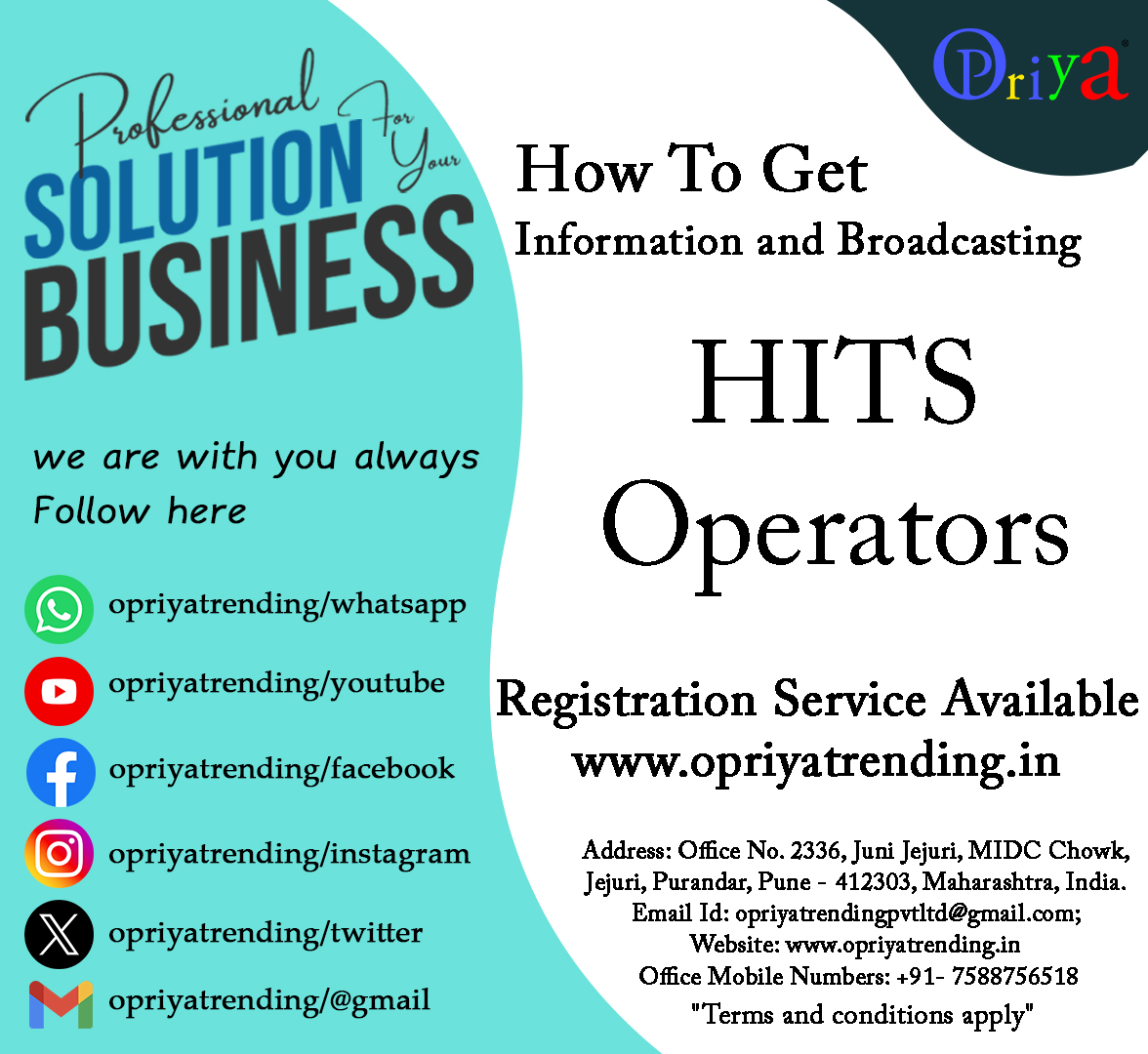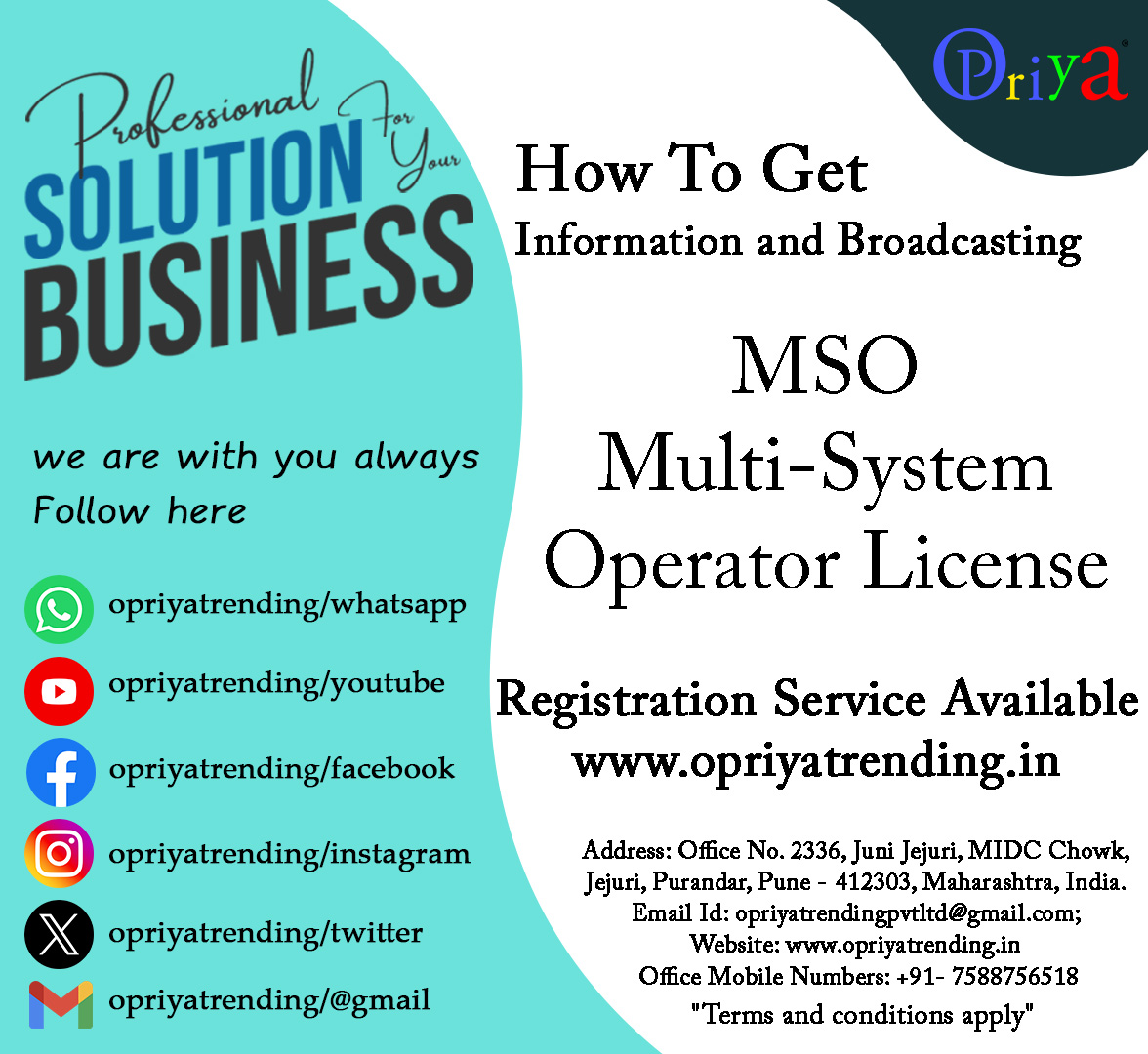Local Cable Operator Registration
Table of Contents
1. Introduction – Local Cable Operator Registration
Local Cable Operator Registration is a mandatory compliance requirement for individuals or businesses intending to offer cable television broadcasting services in India. This registration authorizes local cable operators (LCOs) to provide cable services under the regulatory framework established by the Ministry of Information and Broadcasting (MIB) and the Telecom Regulatory Authority of India (TRAI). If you’re planning to operate as a cable service provider in a particular locality, city, or town, Local Cable Operator Registration is your legal gateway to get started confidently and without hassle.
The importance of this license cannot be overstated. It ensures lawful operations, protects the interests of consumers, and upholds national broadcasting guidelines. In the dynamic era of media and digital broadcasting, registering as a Local Cable Operator enhances credibility, attracts better partnerships, and fosters customer trust. Whether you’re an individual entrepreneur or a company planning to enter the cable broadcasting market, Local Cable Operator Registration is your first and most crucial step.
O’Priya Trading Pvt Ltd specializes in guiding applicants through the entire licensing journey—from document preparation to application filing—ensuring 100% compliance and timely approval. Let’s dive deeper into the types of licenses, who needs them, the process, and how you can apply for Local Cable Operator Registration today.
2. Types of Licenses Offered Under Local Cable Operator Registration
When it comes to Local Cable Operator Registration, the Ministry offers specific license types depending on operational scale and service delivery mode:
1. Individual LCO License:
This license is meant for small-scale operators offering cable services in a limited area like a neighborhood, locality, or town. It is most commonly issued.
2. Multi-System Operator (MSO) License:
Though not strictly LCO, MSOs coordinate multiple LCOs and may need individual LCO licenses for their branches.
3. Headend-in-the-Sky (HITS) Partner License:
LCOs that relay digital signals via satellite may require HITS support and need LCO licensing as a compliance check.
Each of these licenses serves a specific need in the cable ecosystem, but they all fall under the primary compliance bracket of Local Cable Operator Registration.
3. Who Needs Local Cable Operator Registration?
Local Cable Operator Registration is required by:
- Individuals aiming to start local cable TV services.
- Private companies seeking regional content delivery.
- Partnership firms entering the broadcasting space.
- Existing broadcasters expanding operations.
- MSOs managing network of LCOs.
For example, if you plan to start cable services in Jaipur or expand your digital cable services to another district, obtaining Local Cable Operator Registration is non-negotiable.
4. Why Choose O’Priya Trading Pvt Ltd as Your License Registration Partner?
O’Priya Trading Pvt Ltd is a reputed license registration facilitator offering 360° support for Local Cable Operator Registration. Here’s why we’re the right choice:
- Expertise in Broadcast Licensing: Over 8 years of experience.
- Zero Rejection Policy: High approval rate through error-free application submissions.
- Dedicated Account Managers: Personalized support from start to finish.
- Affordable Service Packages: Transparent pricing with no hidden charges.
- Legal Compliance Guarantee: We ensure your license complies with TRAI and MIB norms.
With O’Priya, your Local Cable Operator Registration is not just a process—it’s a promise of reliable service and government compliance.
5. Step-by-Step Local Cable Operator Registration Process
Local Cable Operator Registration involves detailed documentation and procedural clarity. Here’s a breakdown:
- Consultation and Eligibility Check:
Evaluate operational area, infrastructure readiness, and business entity. - Document Collection & Preparation:
We help gather and prepare all necessary documents. - Filing Online Application:
Submit the application on the MIB portal. - Verification by Authority:
The Ministry reviews documents and may call for clarification. - Grant of Registration Certificate:
Once approved, a valid Local Cable Operator Registration certificate is issued. - Compliance Monitoring:
Post-registration, ensure compliance with local cable regulations.
O’Priya Trading Pvt Ltd assists at every step, ensuring a smooth, compliant, and timely registration.
6. Required Documents for Local Cable Operator Registration
Here’s a list of documents required:
- Identity Proof (Aadhaar/PAN): For individual or firm’s authorized representative.
- Business Registration Certificate: For company or firm applicants.
- GST Certificate: Required for tax compliance.
- Network Diagram: Layout showing service area.
- Undertaking Letter: Declaration of regulatory compliance.
- No Objection Certificate (NOC): From local authorities, if needed.
Every document must be scanned and submitted in prescribed format. O’Priya ensures documents are accurate and formatted correctly for successful Local Cable Operator Registration.
7. Cost Involved in Local Cable Operator Registration
Our professional fee for Local Cable Operator Registration typically starts from ₹15,000 onwards depending on your region, scope of services, and document availability. The cost includes:
- Application drafting and filing
- Advisory service
- Documentation assistance
- Follow-ups and clarifications
Government fee is additional and depends on jurisdiction. Bulk discounts available for multi-location operations.
8. Payment Refund Policy – Transparent and Honest
Please note, once Local Cable Operator Registration is initiated, the fee is non-refundable as per government norms. However, O’Priya Trading Pvt Ltd offers a 30-day service re-engagement guarantee in case of rejection or delay. We work with utmost sincerity for success on the first attempt.
9. Terms and Policy
All applications for Local Cable Operator Registration must abide by MIB and TRAI regulations. Applicants must:
- Not have any pending legal disputes
- Submit genuine and verifiable documents
- Avoid any false representation
Violations may lead to cancellation of the license.
10. Time Taken for Local Cable Operator Registration
Typical timeline:
- Document Review: 2–3 working days
- Application Filing: 1–2 working days
- MIB Review: 15–20 working days
- Final Approval: Within 30 days on average
We aim to complete Local Cable Operator Registration in 15 to 30 working days.
11. Common Mistakes to Avoid in Local Cable Operator Registration
Avoid these issues:
- Submitting incomplete forms
- Uploading unclear documents
- Missing network diagrams
- Ignoring local compliance guidelines
- Failing to update GST or business certificates
Each of these errors can delay or reject your Local Cable Operator Registration application. O’Priya ensures each step is double-checked.
12. 📞 Call-to-Action – Get Started Today!
Ready to secure your Local Cable Operator Registration?
📧 Email: opriyatrendingpvtltd@gmail.com
📱 WhatsApp: +91 7588756518
🌐 Visit: www.opriyatrending.in
📘 Facebook: O’Priya Trending Pvt Ltd
We’re just a message away to help you apply with full confidence!
13. FAQs – Local Cable Operator Registration
Q1: What is Local Cable Operator Registration?
A1: It is a license from the Ministry of Information & Broadcasting that allows individuals or firms to operate cable TV services legally.
Q2: How long does the process take?
A2: Typically 15 to 30 working days, depending on document readiness.
Q3: Is GST registration mandatory?
A3: Yes, GST registration is mandatory for Local Cable Operator Registration.
Q4: Can I apply without a business registration?
A4: No. You must be a registered entity (firm, partnership, company, etc.).
Q5: Will I get help with document preparation?
A5: Yes, O’Priya offers full support for documentation and application filing.
In today’s complex regulatory landscape, obtaining licenses and regulatory approvals in India has become more essential than ever for businesses, institutions, and individuals. Whether it’s an arms license, FSSAI registration, company incorporation, or compliance with the latest government norms, having the right license determines your legitimacy, credibility, and operational capacity.
One company leading this transformation by providing seamless, reliable, and legally compliant license registration services across India is O’Priya Trading Private Limited. With a strong commitment to transparency, process efficiency, and client satisfaction, O’Priya Trading Pvt. Ltd. has emerged as a trusted name in the Indian licensing domain.
🔷 Company Overview
Legal Name: O’Priya Trading Private Limited
Nature of Business: License Registration, Compliance Advisory, Government Liaison Services
Operational Scale: Pan-India
Head Office: Registered in India, with service availability across all states and union territories
📞 Call-to-Action (CTA) – Apply Now with Confidence!
Ready to secure your Licence Apply with Full Confidence in All Indiaa?
👉 Contact Us Today!
📧 Email: opriyatrendingpvtltd@gmail.com
📱 WhatsApp: +91 7588756518🔗 Website: https://opriyatrending.in👍 Facebook: O’Priya Trading Pvt Ltd
Apply with Full Confidence in 2025.
🏛️ What Does O’Priya Trading Pvt Ltd Do?
O’Priya Trading Private Limited specializes in license registration services across India, offering a full range of end-to-end solutions to institutions, businesses, and individuals seeking regulatory permissions and licenses. From document preparation to submission, legal verification, and post-approval compliance, they serve as a single-window license consultancy provider.
🗺️ Pan-India Service Coverage
What makes O’Priya Trading unique is its all-India licensing facilitation network. Unlike regional agencies that operate within narrow jurisdictions, O’Priya has built an operational capacity to deliver services in every Indian state and union territory.
🌍 States Served Include:
- Delhi, Maharashtra, Uttar Pradesh, Gujarat, Rajasthan, Madhya Pradesh, Karnataka, Tamil Nadu, Kerala, Telangana, Punjab, Haryana, Assam, West Bengal, Bihar, Jharkhand, Odisha, Chhattisgarh, and more.
🏢 Cities with Active Clients:
- Mumbai, Pune, Delhi, Hyderabad, Bangalore, Kolkata, Ahmedabad, Chennai, Jaipur, Lucknow, Bhopal, Indore, Surat, Patna, and others.
Through a digital-first approach, coupled with experienced local legal liaisons, O’Priya ensures consistency in documentation, faster government approvals, and responsive client support.
💡 Why Clients Trust O’Priya Trading Pvt Ltd
1. ✅ Transparency & Ethics
🔒 100% Transparent | No Hidden Fees | Pan-India Services We believe in:
- Clear timelines
- Upfront pricing
- Honesty about payment policies (non-refundable, refundable, no surprises)
- Total confidentiality
2. 🧾 Documentation Expertise
Most license applications are delayed due to incomplete, incorrect, or improperly formatted documents. O’Priya’s legal consultants help you prepare foolproof documentation as per the latest formats demanded by regulatory bodies.
3. 🧑⚖️ Government Liaison
Whether it’s a district magistrate’s office, arms licensing authority, food safety department, or ROC office, O’Priya has built solid working relationships with relevant departments across states.
4. 🚀 Quick Turnaround
With strong process knowledge and digital tools, O’Priya delivers faster application submissions, consistent follow-ups, and streamlined approvals—ensuring minimal disruption to your business.
5. 💬 Client-Centric Support
They offer multi-channel communication: WhatsApp, email, video calls, and in some cases, in-person assistance. Clients are never left guessing about the status of their application.
📂 Service Flow: How It Works
Step 1: Free Consultation
Client reaches out via WhatsApp or email. A dedicated case manager responds with guidance and documentation checklist.
Step 2: Document Compilation
The team helps the client gather and format all required documents—identities, justifications, organizational registrations, etc.
Step 3: Application Filing
Forms are filled and submitted either physically or digitally, depending on the department’s workflow.
Step 4: Verification Support
Whether it’s a police inquiry or local office inspection, the team ensures you’re prepared and compliant.
Step 5: Approval & Delivery
Once approved, the license or certificate is collected and shared with the client via secure channels. Renewals and annual compliances are also managed, if opted for.
🔍 Industries Served
| Industry | Licenses Provided |
| Security | PSARA, Arms License |
| Food & Beverages | FSSAI, Shop Act, GST |
| Manufacturing | Factory License, Pollution NOC |
| Healthcare | Drug License, Biomedical Waste License |
| Retail & E-commerce | GST, MSME, Trademark |
| Education/Training | Arms License (Training), ISO, Accreditation support |
This industry-specific approach helps clients get exactly what they need—no more, no less.
📊 Success Metrics (As of 2025)
- ✅ 4,000+ Licenses Approved
- ✅ 95% Success Rate on First Submissions
- ✅ 100+ Cities Served
- ✅ 40+ License Categories Covered
- ✅ 500+ Institutional Arms Licenses Facilitated
🔄 Annual Compliance Services
Beyond just registration, O’Priya also offers post-licensing support, such as:
- Annual license renewals
- Change of address or ownership updates
- Firearms inspection audit preparation
- Document maintenance and digital filing
- Regulatory upgrades (as per rule changes)
This holistic approach ensures clients remain compliant even after license issuance.
📌 Why Choose O’Priya Over Others?
| Feature | O’Priya Trading Pvt Ltd | Typical Local Agent |
| Service Reach | Pan-India | Limited to district/state |
| Process Transparency | High (With Updates) | Often vague or hidden |
| Legal Expertise | Qualified Advisors | Informal guidance |
| Communication | Email, WhatsApp, Call | Mostly phone |
| Refund/Policy Clarity | Documented Terms | Unclear or non-existent |
| Renewal Reminders | Included | Rarely provided |
For businesses and institutions who cannot afford non-compliance or delays, O’Priya offers institutional-grade service quality at competitive prices.
🧭 Vision and Future Outlook
O’Priya Trading Pvt Ltd envisions becoming India’s most trusted regulatory compliance partner. With ongoing investments in:
- AI-based document automation
- Online dashboards for tracking license status
- Partnerships with regional lawyers and consultants
- Digital KYC and identity verification tools
…they aim to make India’s license ecosystem simpler, faster, and corruption-free.
Call-to-Action (CTA) – Apply Now with Confidence!
Ready to secure your Licence Apply with Full Confidence in All Indiaa?
👉 Contact Us Today!
📧 Email: opriyatrendingpvtltd@gmail.com
📱 WhatsApp: +91 7588756518🔗 Website: https://opriyatrending.in👍 Facebook: O’Priya Trending Pvt Ltd
Apply with Full Confidence in 2025.
🛡️ Legal. Reliable. Fast. That’s the O’Priya Promise.
📋 List of Services (with Reconstructed Links)
Below is the categorized list of services as per the website’s usage index. Where possible, we’ve added direct or pattern-based links.
1. Arms License Services
- Arms for Individual License Registration
- Arms for Institution License Registration
- Arms for Sports License Registration
- Arms for Dealers License Registration
- Weapons Manufacturing License Registration
2. AYUSH License
- AYUSH Loan & Others License
- AYUSH Manufacturing License
- AYUSH Distribution License
- AYUSH Clinic License
- AYUSH Retail License
3. BIS/ISI/ISO Certifications
4. Compulsory Registrations
- MSME/Udyam Registration
- Startup India Registration
- FSSAI Registration (Central/State)
- Legal Entity Identifier Code
- Trade License
- Fire License
- Digital Signature
- ICEGATE Registration
- FCRA Registration
- 80G and 12A Registration
5. DOT/Telecom Licenses
- ISP License
- NLD/ILD License
- UL VNO License
- PM-WANI Registration
- SACFA Clearance
- IP-1 Registration
- TEC Certificate
- AGR Return Filing
6. Drug License
7. Electrical License
8. GST & Taxation
9. IPR Services (Trademark, Copyright, Patent)
- Trademark Registration
- Trademark Objection Reply
- Patent Filing (Provisional/Complete)
- Copyright Registration
- Design Registration
10. Liquor License
11. MCA Services
- Private Limited Company Registration
- LLP Registration
- OPC Registration
- Annual MCA Compliance
- Company Closure
12. PESO License
13. PSARA License
14. Pollution Control
15. Regulatory Bodies
- NBFC Registration (RBI)
- FFMC & P2P Lending
- Legal Metrology Packager License
- IRDAI Corporate Agent License
📞 Contact O’Priya Trading Pvt Ltd Today
👉 Contact Us Today!
📧 Email: opriyatrendingpvtltd@gmail.com
📱 WhatsApp: +91 7588756518🔗 Website: https://opriyatrending.in👍 Facebook: O’Priya Trending Pvt Ltd
🛡️ Legal. Reliable. Fast. That’s the O’Priya Promise.
💖 Why opriyatrending.in is More Than Just a Service Platform
In a country as vast and complex as India, navigating government registrations can feel overwhelming, stressful, and even hopeless at times. But opriyatrending.in doesn’t just offer “services.” It offers reassurance, clarity, and a sense of control—when you need it most.
🛑 The Fear of Rejection, Delays, and Loss
You might have tried applying for licenses yourself before—endless documents, non-responsive departments, confusing portals. It can leave you feeling:
- ❌ Lost in bureaucracy
- ❌ Afraid your business will never take off
- ❌ Unsure who to trust
O’Priya Trading Pvt. Ltd. understands this fear—and fights it by giving you the guidance you were never offered before.
💪 A Partner in Your Growth Journey
Whether you’re a dreamer starting your first startup, a farmer protecting your land, a doctor opening a clinic, or a dealer building your future—this company walks beside you.
- They help you register your identity
- They protect your investment
- They stand between you and the wall of red tape
When opriyatrending.in helps you get your license, they’re not just checking boxes. They’re helping you move forward with confidence.
🧠 A Calm Voice When Everything Feels Chaotic
In a system full of delays, errors, and vague processes, opriyatrending.in offers:
- 🧾 Clear documentation guidance
- 🕐 Honest timelines
- 📞 A human voice when you call or WhatsApp
When you’re in a crisis—whether it’s a license rejection or urgent compliance—they don’t ignore you. They respond. They care.
🌱 Your Dreams Deserve to Be Legal, Protected, and Empowered
Every license, every registration, every clearance—represents a life goal.
It’s your right to:
- Own a weapon for protection
- Start a small company
- Launch a new StartUp company
- Open a food business legally
- Register a company and pass it on to your children
Opriyatrending.in ensures that no dream is delayed because of red tape.
🔗 It’s Not Just a Website It’s a Lifeline.
📍 When you open opriyatrending.in, you’re not just clicking on a page.
You’re saying:
“I’m ready to take a step toward my dream, but I need help.”
And that’s exactly what O’Priya Trading Pvt. Ltd. is here for.
📞 Contact O’Priya Trading Pvt Ltd Today
👉 Contact Us Today!
📧 Email: opriyatrendingpvtltd@gmail.com
📱 WhatsApp: +91 7588756518🔗 Website: https://opriyatrending.in👍 Facebook: O’Priya Trending Pvt Ltd
🛡️ Legal. Reliable. Fast. That’s the O’Priya Promise.





